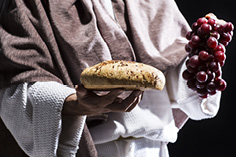 How do you forgive someone in the context of everyday life? It's not that easy at all. Some cultures have regular forgiveness rites. For example, the Maasai in Tanzania perform a so-called Osotua, which means something like "covenant". Vincent Donovan recounts how Osotua works in his captivatingly written book Christianity Rediscovered. If an offense has been committed within a community among families, it can have devastating effects on the unity of the nomadic tribe as a whole. Coexistence is in danger.
How do you forgive someone in the context of everyday life? It's not that easy at all. Some cultures have regular forgiveness rites. For example, the Maasai in Tanzania perform a so-called Osotua, which means something like "covenant". Vincent Donovan recounts how Osotua works in his captivatingly written book Christianity Rediscovered. If an offense has been committed within a community among families, it can have devastating effects on the unity of the nomadic tribe as a whole. Coexistence is in danger.
It is therefore imperative that both parties involved in the dispute be brought together in an act of forgiveness. The community prepares a meal, to which the families involved contribute the ingredients. Both the person concerned and the sinner himself must accept and eat the prepared food. The meal is called the "sacred food". The underlying idea is that forgiveness is associated with eating the food and a new Osotua begins. Amazingly simple and simple!
Have you shared sacred food with someone you dislike or sin on someone? What about the sacrament? Can a new covenant of forgiveness be made between you and someone you have sinned against or who has sinned against you while you celebrate the sacrament together? «Therefore, if you offer your gift on the altar and there it occurs to you that your brother has something against you, leave your gift there in front of the altar and go there first and be reconciled with your brother, and then come and offer your gift »(Matthew 5,23-24)
How about a meeting to share “sacred food” together? Or are you carrying the same grudge from one supper to the next? Donovan comments on the Maasai custom: "The exchange of holy food testifies to forgiveness anew". What a blessing if we can actively support the call in the above quotation, our Lord and Savior.
by James Henderson
This website contains a diverse selection of Christian literature in German. Translation of the website by Google Translate.